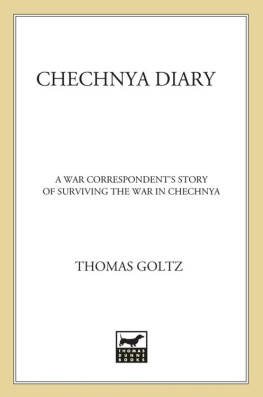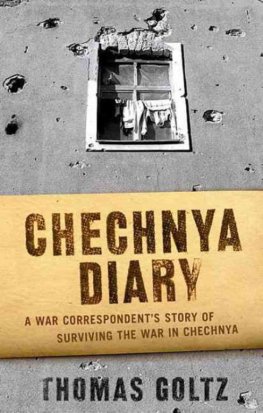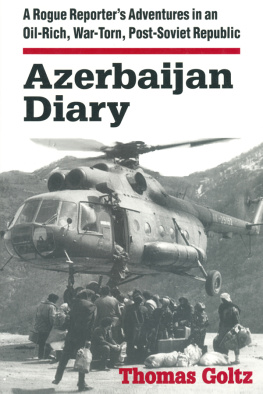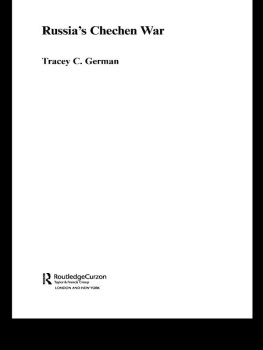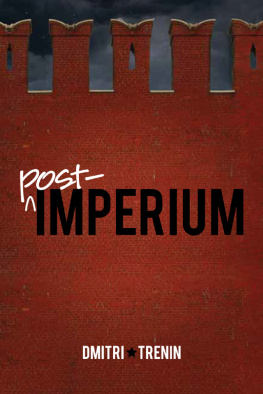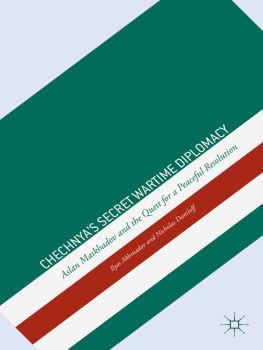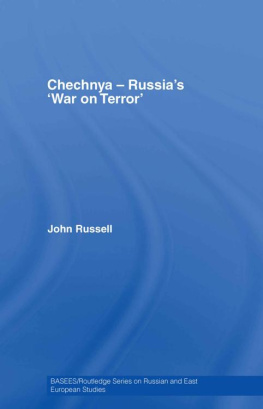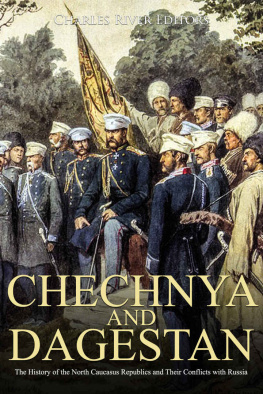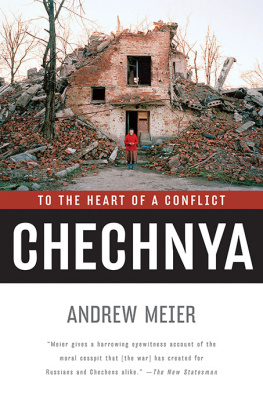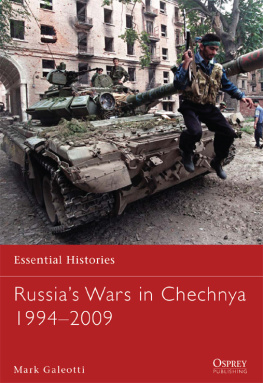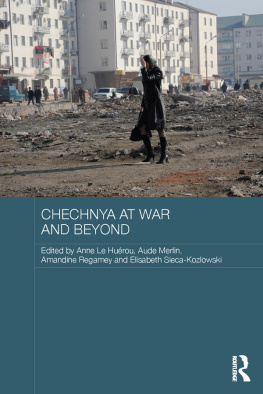T here are many people involved in the creation of this book, some whose family names I never knew, remember imperfectly, or chose not to reveal.
At the top of the list is Hussein and his extended family, who invited me into their lives during a period of extreme confusion and duress. I doubt any will ever see this work, but for the record: barkal to Ussam, Shirvani, Xamid, Seylah, Sultan, Rana, as well as Isa, Musa, Muhammad, Commander Ali and his sons Osman and Omar, Akhmad Amaev, and all other friends, alive or dead, from the small town of Samashki.
Although most of my work was performed solo, at times I was often dependent on the generosity of friends and colleagues for transportation, telephone, and even toothpaste. Special thanks are thus due the extraordinary Lawrence Sheets, Elif Kaban, Robert Finn, Andrew Harding, Alexis Rowell, Colin Peck and Sonia Mikich, Stanley Greene, Natalie Nougayrede, Rachel Danbar, Peter Burckhardt, Vanora Bennett, Steve Coppen of ABC TV/Moscow, and, hugely, Danny Schechter of PBS/Global Vision. Other angels in the media include Mark Foley, Bill Holstein, Kevin Buckley, the BBCs Keith Bowers, and Nik Gowing. Hand-holders range from Margot Kidder, Bill Campbell and Teddy Yates in Montana and, particularly, Jeannie Matthews in London. Readers and critics of the draft manuscript include Charles Frissell, Uta Gaedeke, Bob Mason, Judy Muncy, Gengiz Hancer and, especially, Doctor Ewen Patterson. Thanks to each and every one.
Those who have written books on Chechnya represent a small circle of friends and colleagues whose devotion to the tragic subject doesnot allow for rivalry. I cite only a few here. Tom de Waal and Carlotta Galls Chechnya: A Small Victorious War (U.K. 1997, U.S.A. 1998) was the first contemporary history about the war in Chechnya written by western journalists and it remains a milestone accomplishment of analysis and powerful writing. Anatol Lievens Chechnya: Tombstone of Russian Power (1998) is arguably the most comprehensive analytical work to appear to date, and is essential reading. Sebastian Smiths Allahs Mountains (1998) and Chris Birds To Catch a Tatar (2002) are well-written accounts of their experiences in the Caucasus with a focus on the first round of war of 1994-96. The category of woman-goes-to-war is covered by the Russian journalist Anna Politkovskaya in her A Dirty War (2001) and the French reporter Anne Nivat in her Chienne du Guerre (2001), both of which are gritty journalistic accounts of the renewed violence of 1999. Vanora Bennetts Cry Wolf! (1998) is more a rhapsody of discovery of the Chechens, while Scott Andersons The Man Who Tried to Save the World (1999) is a fascinating study of the life and times of the American aid worker Fred Cuny, who disappeared in Chechnya, even though most of his life (and thus the focus of the book) was spent elsewhere. Yoav Karnys The Highlanders (2000) contains important material on the Chechen diaspora community in the Middle East.
Academic institutions or individuals who have influenced my thinking (or indirectly supported me by means of invitations to speak) include Ned Walker of Berkeley, Stephen Jones of Mount Holyoke, Fred Starr and Charles Fairbanks of Johns Hopkins in D.C., as well as Ken Jensen, executive director of the American Committee on Foreign Relations, who sent me spinning through the American heartland to tell the good folks of Casper, Billings, Boise, Little Rock, Louisville, Tampa, Salt Lake, Rochester (and elsewhere) of the dynamic at play in Chechnya and the Caucasus. Paul Henze shared many published and unpublished manuscripts on the Caucasus with me, and directed me to such luminaries as the Benningsons and Moshe Gammon. I also owe a great debt to Valeri Tishkov for his significant contribution to the study of ethnic insanity in the former USSR, best summed up by the subtitle of his classic Ethnicity, Nationalism and Conflict in andAfter the Soviet Union: The Mind Aflame (1997) as well as to Terry Martin, whose The Affirmative Action Empire (2001) should soon be declared to be the academic benchmark on the formative process of Soviet nationalities policy. Other useful works that I should mention include Ben Fowkess Russia and Chechnya: The Permanent Crisis (2000), Robert Seelys Russo-Chechen Conflict 1800-2000 (2001), as well as diverse articles and books by the remarkable Ron Suny, whose bibliography of work on the Caucasus might fill up a volume by itself.
Then there is Georgii Derlugian, professor of sociology at Northwestern University, to whom I wish to give special thanks not only for sharing his insights, but for squeezing me out of the realm of romancing the Chechens as noble warriors and to see their particular tragedy as part of a larger sociological context of state building and (self-) destruction. The essence of his argument, set forth in a series of deliciously complex articles in publications such as the New Left Review , and soon to appear in book form, is that the Chechen bid for independence was doomed to failure from the start because of the collapse of the USSR, and the fact that rebellious Chechnya lacked a client relationship with an outside power that would have elevated the Chechen-Russian confrontation to that of a battle of proxies in the larger Cold War. Instead, the brutalized and betrayed Chechens are now in the process of reverting from being a national community to being a religious groupand one more inspired by the Wahhabite school of Islam, practiced by Osama bin Laden, than the nationalist aspirations of Chechen President Djohar Dudayev a decade before.
T he above reference to the late president of Chechnya is a good point of departure to lay out a few notes on transliterations of proper names from Russian and Chechen. In the literature, the reader encounters everything from Dzhokhar to Djohar to Jokhar and even Johar. I have opted for the most common of the variations, Djohar, because it is closest to the sound of the name when spoken in English. Other common Muslim names, such as Ibrahim and Muhammad, have been rendered as pronounced in Chechen (or Turkish or Arabic) and not howsuch names are transliterated in English from Russian, which lacks a soft h and replaces that consonant with a g e.g., Ibragim and Mugammad /Mogammadrather like transliterating Henry to Genry.
Finally, I would like to thank both my literary agent, Diana Finch, and editor and publisher, Peter Wolverton, for their extreme patience with me in finishing this book. By my estimation, I was embarrassingly close to being exactly seven hundred days overdue in submitting the manuscript in its final form.
The reasons for that, I hope, will become clear to anyone who reads the following pages. Writing the story of Samashki and Hussein has been a very painful process.
I fervently hope that it has been worth it for all concerned.
STUMBLING TOWARD SAMASHKI
A Human Rights Watch research team in Ingushetia has interviewed five survivors of an October 27 Russian attack on Samashki village, located some eighteen miles west of Grozny. Witnesses said the village was repeatedly shelled, beginning on October 15. The heaviest assault appears to have occurred on October 27, when dozens of Samashki civilians were injured or killed. Human Rights Watch has no information regarding possible military targets in the village. The Russian attack struck homes inhabited by dozens of noncombatants.
Beginning late at night on Oct 26, Russian shells fell with increasing intensity on Samashki. We had taken shelter in our neighbors basement, recalled Malika Abdullaeva, a thirty-year-old school-teacher. There were about seventy people with us underground, in cluding many children and babies. At eleven P.M. on October 27, Abdullaeva took advantage of a lull in the shelling to leave the shelter and look for food together with her twenty-five-year-old sister, Satsita. As they returned to the basement, the house standing above the shelter suffered a direct hit. The two sisters, located some fifteen yards away, were thrown to the ground by the force of the blast. Malika was hit by shrapnel in her right thigh, while Satsita was wounded in her back and left leg. Because no bandages were available, their injuries were bound with torn cloths.

